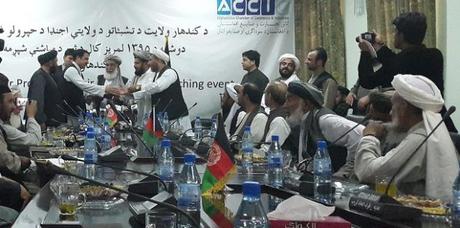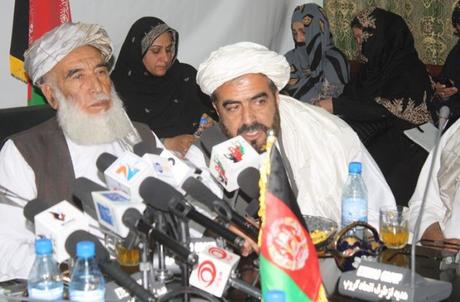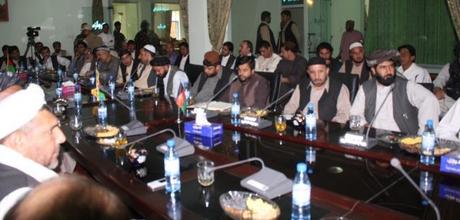
On April 27, the Kandahar branch of the Afghan Chamber of Commerce & Industries and 28 other major business and sectoral associations in Kandahar province, with CIPE’s support, released the Kandahar Provincial Business Agenda report at an official launch event in Kandahar City.
The PBA report lists the primary concerns of the private sector and impediments to commercial growth in Kandahar and other neighboring provinces, as well as a set of concrete policy recommendations intended to overcome these barriers. These policy recommendations include requests to simplify business registration procedures and documents, lowering tax rates, and improving public infrastructure, as well as recommendations more specific to Kandahar province, including taking steps to improve security conditions at the border crossing in Boldak, on the Pakistani border.
More than a hundred prominent private sector and business association leaders attended, along with civil society and media representatives and elected and appointed government figures, including Kandahar Provincial Governor Humayon Azizi, and Haji Agha Lalai Dastagery, Advisor to the Afghan President.
CIPE Program Director Mohammad Naim opened the event with a keynote speech emphasizing the importance of advocating in a collaborative manner for reforms that will improve the business climate and encourage economic development in Kandahar and the neighboring provinces, and described the key role the Provincial Business Agenda report plays in this process, by reflecting the concerns and opinions of the businesspeople and entrepreneurs across southern Afghanistan. Following the conclusion of the event, an Advocacy Task Force was created, consisting of prominent members of both the private and public sectors, to guide the subsequent advocacy efforts and ensure the various recommendations and concerns outlined in the PBA report are acted upon by the provincial government.
The report was developed after a summit meeting of over 450 business people and entrepreneurs, representing all of the major business and sectoral associations in Kandahar, was held in late February. Over twenty representatives from women’s business associations attended, as well as representatives from neighboring, Zabul, Helmand, and Uruzgan provinces, reflecting the important role the PBA program plays in strengthening economic participation among marginalized groups and encouraging commercial growth not just in Kandahar, but across southern Afghanistan.
Haji Sayed Jan Khakrezwal, the chairman of the Kandahar Provincial Council, emphasized the important role the PBA program plays in economic development in Kandahar by stating, “A conducive environment for businesses does not exist in Kandahar. If the government does not improve the business climate, most of the businesspeople will take their money to foreign countries and close their businesses in Kandahar. I urge the governor and heads of relevant departments to implement the PBA recommendations. I assure the business community that the Provincial Council will stand with them and fully support their demand for improving business climate in Kandahar.”

The release of the PBA report was lauded and well received by attendees from both the public and private sectors. Kandahar Provincial Governor Humayun Azizi was particularly enthusiastic in his response, stating that, “it is the responsibility of the government to create an enabling business environment for the private sector so that they invest in the country, expand their businesses, create job opportunities for youth and assist in improving the living standard of the middle class in the country.”
He further stated that Afghanistan’s stability is dependent on economic growth and the well-being of the Afghan people. The governor pledged to work with the ATF on a regular basis to address the private sector’s concerns and policy recommendations. He additionally proposed that several top provincial government officials, including Mohammad Rahim Rahimi, Director of the Provincial Economic Department, be a part of the Advocacy Task Force.
This enthusiasm was echoed by Haji Agha Lalai Dastagery, Economic Advisor to President Ghani, who said, “all government officials in Kandahar should commit themselves to resolving the problems of the business community and implement the PBA reccomendations. I assure the participants that I will meet the president and line ministries and seek their help in the implementation of the PBA recommendations.”
The commitment displayed by members of the Kandahar provincial government is particularly encouraging, indicating that prospects for public-private partnership in developing future economic reforms are high, meaning that future policies will better reflect the needs and concerns of the business community itself.

The success of the Kandahar Provincial Business Agenda comes at an opportune time, as forecasts for development and stabilization in Afghanistan are increasingly bleak. The economic situation remains dire, corruption is rampant, and the Taliban and other anti-government insurgent groups continue to make territorial gains. Southern Afghanistan has been particularly hard hit by the conflict, with districts in provinces such as Helmand and Uruzgan frequently changing hands between government forces and insurgent groups.
As is the case with other regions of the country, and with many other conflict afflicted countries, there are strong correlations between violence and political instability, and corruption and lack of economic opportunities. Many Afghans are drawn to the Taliban and other anti-government groups not because of shared extremist ideology or values, but because they are increasingly frustrated with lack of economic opportunities, and the corruption that permeates every facet of Afghan society.
In the face of such concerns, the success of CIPE’s Provincial Business Agenda program becomes even more crucial to the success of Afghanistan, as it works to improve the business climate of regions such as Kandahar, and encourage the private sector growth needed to reverse the economic downturn felt since the international military drawdown in 2014. As indicated by the overwhelming success of the Kandahar PBA summit meeting and report release, the Afghan private sector remains resilient and committed to bringing about the political reforms needed to generate the commercial growth needed for the Afghan economy to turn itself around. Moving forward, it will be imperative to give them the support they need to work closely with Afghan government policymakers and elected officials to ensure that these goals are met, and that economic conditions and prospects for recovery can improve in Afghanistan.
Vivek Shivaram is a Program Assistant for South Asia.

